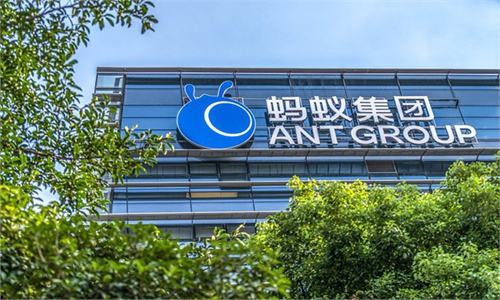Ant Group’s pulled IPO less likely to be rekindled under current organizational structure

A customer uses a facial-payment system supported by Alipay technology at a bookstore in Hangzhou, East China's Zhejiang Province, on July 17, 2019. Photo: IC
China's securities regulator on Friday unveiled revised guidelines on qualifications for listings on the NASDAQ-style sci-tech board in Shanghai, which set limits on fintech IPOs and bar financial investment firms from seeking a listing in the market.
The revision is a much-needed effort to align the Shanghai market with China's push for breakthroughs in especially cutthroat technologies, market watchers said.
The updated guidelines might sink hopes for Ant Group to rekindle its pulled IPO under its current organizational structure, they said, envisioning the possibility of the would-be financial holding firm to mull ways to list its most sci-tech part in the market.
The revised system of indicators for evaluating the sci-tech attributes of firms filing for an IPO in the STAR Market in Shanghai creates a clear-cut yet feasible negative list, and imposes strict limits on industries eligible for Star Market listings, Li Weiyou, deputy director of the Department of Public Offering Supervision at the China Securities Regulatory Commission (CSRC), said at a press conference on Friday.
Firms engaging in six industries including new-generation information system and high-end equipment will be supported to float on the market. Companies falling under fintech innovation will have their IPO plans combed through and their listings in the Shanghai market will be restricted, according to the CSRC official.
Real estate firms and those principally engaging in financial investment will be banned from floating on the Shanghai market.
The revised guidelines on a trial basis took effect on Friday as an update to the rules that were initially announced in March 2020.
The revision suggests Ant's suspended IPO may never be rekindled, judging by its existing business lineup, Dong Shaopeng, a senior research fellow at the Chongyang Institute for Financial Studies of Renmin University of China, told the Global Times on Friday.
Ant didn't reply to a request for comment as of press time.
The Alibaba fintech offshoot's dual IPO in Shanghai's STAR Market and Hong Kong were suspended in early November ahead of their planned debut, after its management was interviewed by the country's financial regulators.
Ant will apply to transform itself into a financial holding company as part of a multifaceted rectification plan, Pan Gongsheng, central bank deputy governor, announced Monday after top financial authorities summoned Ant for a third regulatory meeting since November.
The revised guidelines were introduced on the back of lessons from Ant's IPO suspension, said Dong, also an expert adviser for the securities regulator, citing data revealed by Ant in its initial prospectus that its sales revenues and profits vastly come from its credit business.
Lauding the revision as a much-needed attempt to truly let the most innovative tech firms float on the sci-tech board, he called for efforts to streamline IPOs for firms scrambling for breakthroughs in cutthroat technologies.
In a sign of a narrower road for fintech IPOs on the Shanghai board, Chinese online retailer JD.com's fintech unit withdrew its filing for an IPO in the STAR market earlier in April.
Prior to its rectification, Ant wasn't in accordance with the Shanghai market's push for sci-tech firms from the aforementioned six industries to seek IPOs, Wu Jinduo, head of fixed income at the research institute of Great Wall Securities in Shanghai, told the Global Times on Friday.
If Ant's research and development spending on its payment service hits the STAR Market threshold, the company might take a detour to reconfigure its IPO plans, Wu said, speaking of the possibility of an IPO revival in case of future organizational changes.
The repercussions of the revision-induced setback on Ant's Hong Kong IPO remain unclear.
The Hong Kong market is open to fintech IPOs, although Chinese fintech firm Bairong's debut in Hong Kong at the end of March turned out to be a disappointment with its shares plunging 16 percent on IPO day, rendering it the worst debut among IPOs topping $500 million in the Hong Kong market in three years.

